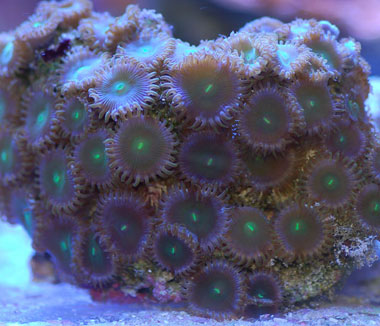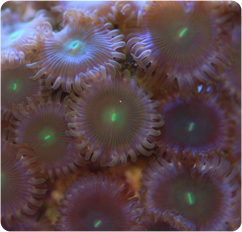|
Handling Zoanthids - Some Zoanthids Produce a Deadly Toxin
Some Zoanthids Produce a Deadly Toxin and Require Caution when Handling 
Aquarists love zoanthids for many good reasons, but it is important to remember to exercise caution when handling these animals. Species of zoanthids from the genus Palythoa (which currently include P. caribbea, P. grandis , P. mammillosa, P. nigricans, and P. texaensis) contain a toxin called Palytoxin, which can be very dangerous to humans. For this reason, it is essential to wear gloves when handling zoanthids from the family zoanthidae including species from the popular Zoanthus, Palythoa and Protopalythoa genera.
“The Most Potent Marine Toxin Known”
“Palytoxin (PTX), isolated from a zoanthid of the genus Palythoa, is the most potent marine toxin known,” writes Robert Sheridan and Michael Adler of the US Army Medical Research Institute of Chemical Defense. The article, entitled “Cytotoxic Actions of Palytoxin on Aortic Smooth Muscle Cells in Culture”, appeared in 2005 in The Journal of Applied Toxicology. “Intoxication by PTX leads to vasoconstriction, hemorrhage, ataxia, muscle weakness, ventricular fibrillation, pulmonary hypertension, ischemia and death.”
Luckily, it would be difficult for the aquarist to become intoxicated from a zoanthid to the extent where death would result. While zoanthids, like all cnidarians, do contain nematocysts or stinging cells, zoanthid stinging cells generally do not affect human skin. Instead, the Palytoxin is contained in the mucus produced by the zoanthid, and you would need to ingest this mucus or have it enter your bloodstream directly in order to cause a systemic reaction. As a result, most aquarists experience little more than localized pain and discomfort as a result of handling zoanthids without gloves.
Having said that, it is possible for zoanthid Palytoxin to enter the bloodstream through a cut or other open wound. Indigenous peoples from throughout the Indo-Pacific have known this for centuries and have regularly used Palytoxin derived from zoanthids in both hunting and warfare. In Hawaii, for example, the mucus from locally occurring zoanthids (known regionally as limu-make-o-hana) was used on spear tips for centuries. It is therefore perhaps not surprising that there have been several serious incidences of aquarists with open wounds (even a relatively small cut) becoming quite ill as a result of handling zoanthids without gloves.

Signs, Symptoms and Treatment
For the aquarist, localized numbness and swelling are the most common examples of exposure to Polytoxin. If you experience these symptoms, it is recommended that you flush the area with freshwater for 15 minutes. If the signs or symptoms don’t abate (or if they get worse) seek medical attention.
If sufficient quantities of Palytoxin get into your bloodstream, you may experience nausea and vomiting, muscles spasms, non-localized tingling sensations and numbness, and, ultimately, respiratory distress. These are all indications that the intoxication has gone systemic, and you should seek medical attention immediately.
Conclusion
These beautiful animals are common in the aquarium trade, and while they should not be feared, they ought to be respected. Wearing gloves is a simple and effective precaution that all aquarists should take when handling zoanthids. These fascinating animals are a great addition to almost any marine aquaria—just remember to be cautious when handling them.
|